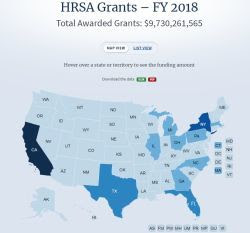
HRSA Fully Supports President Trump's 'Advancing American Kidney Health' Initiative

July 10 - HRSA will work to expand support to living donors and reduce the number of donor organs that are discarded. Meanwhile, HRSA-funded health centers will continue promoting value-based care and focus on outcome-oriented public health interventions that slow the progression of disease from diabetes to kidney failure.
"HRSA will work to remove financial barriers to living organ donations, as well as to reduce the number of kidneys procured but not transplanted," said HRSA Administrator George Sigounas, MS, Ph.D. "In 2017, HRSA-funded health centers cared for more than two million adult patients with diabetes. Diabetes is the leading cause of kidney disease in the United States."
Kidney Accelerated Placement Project Begins July 18
HRSA, in support of President Trump’s ‘Advancing American Kidney Health' initiative, is supporting a new Organ Procurement and Transplantation Network (OPTN) process to test accelerated placement of certain kidneys at high risk for discard. Following recommendations from the National Kidney Foundation Consensus Conference, the OPTN Organ Center will develop and test a proof of concept for expediting allocation of these organs with safety monitoring. The OPTN will evaluate the concept for safety and improvements in allocation efficiency.
HRSA Awards $20 Million to 27 Organizations to Increase the Rural Workforce Through the Creation of New Rural Residency Programs

Today, the Health Resources and Services Administration (HRSA) awarded approximately $20 million for Rural Residency Planning and Development Program (RRPD) grants. Recipients across 21 states will receive up to $750,000 over a three-year period to develop new rural residency programs while achieving accreditation through the Accreditation Council for Graduate Medical Education.
"Health care in America is under increasing strain due to many factors, including workforce gaps. This is a particular problem, because heart disease, cancer, and chronic lower respiratory disease are found at higher rates among rural Americans than urban Americans, and this is contributing to an ever-growing health disparity gap that must be slowed and eventually stopped. Rural residency grants are an effective tool that will help rural communities recruit and retain high quality healthcare providers who can improve access to healthcare and health outcomes for patients," said U.S. Department of Health and Human Services, Deputy Secretary Eric D. Hargan.
|
HRSA Recognizes 10 States for Top Performance at Critical Access Hospitals

July 11 - Today, the Health Resources and Services Administration (HRSA) presented ten states with the 2019 Medicare Beneficiary Quality Improvement Project Quality Performance Awards. These awards recognize achieving the highest reporting rates and levels of improvement in Critical Access Hospitals over the past year.
|
HRSA Launches Groundbreaking Project

Staff from 46 community health centers convened at HRSA on July 8 to discuss an ambitious partnership with NIH to enlist more than 1 million patients in a study across 21 states. The "Precision Medicine Initiative" will look into genetic, environmental and lifestyle markers for clues on how to prevent and treat disease.
"Health centers have a long history of emphasizing the importance of prevention, and using that as a key strategy for improving the health of a wide range of populations. We look to precision medicine to understand variability in disease onset, differences in genetic and environmental risks, and how we can really focus on specific populations and their specific needs." -Diana Espinosa, HRSA Deputy Administrator.
|
HRSA Researchers Acknowledged

HRSA senior scientist and health equity advisor Gopal Singh (OHE) and economist Claire Lin (OPAE) have been acknowledged in the journal Annals of Internal Medicine for groundbreaking work using "Area Deprivation Indexes." Developed by Singh, the indexes repeatedly have shown a link between high-poverty neighborhoods, lower life expectancy among residents and worse health outcomes across a wide range of conditions.
|
Maternal and Child Health Researchers Gather at HRSA

In the largest assembly of HRSA maternal and child health researchers in recent memory, more than 30 HRSA-funded scientists from nine states gathered at HRSA on June 13. The grantees are among the most prominent experts in the nation in such arenas as autism, obesity and childhood neurological disabilities.
HRSA funds 15 research networks involving investigators at 900 universities, colleges, medical centers and other teaching institutions -- many of them long-term, one-of-a-kind projects.
New Pediatric Care Coordination Curriculum

Grounded in American Academy of Pediatrics policy, a new Pediatric Care Curriculum provides tools to measure care coordination activities and support continuous quality improvement efforts.
Supported with funding from HRSA's Maternal and Child Health Bureau, the curriculum is designed to build capacity among diverse stakeholders, including children and youth with special needs.
Check out the new curriculum (PDF - 32 MB), or learn more at the National Resource Center for Patient/Family-Centered Medical Home.
|
How Much Funding Did Your State Get?
 |
In case you haven’t noticed, you can see your state’s funding easily on the data.HRSA.gov home page. Scroll down to see an interactive map – you can also select a list view and download the data in Excel or PDF format.
|
View Upcoming Webinars
Promising Practices for Substance Use Disorder Treatment Among Pregnant and Parenting Women
Two HRSA-funded health centers will share promising practices to treat and support the needs of pregnant and parenting women diagnosed with a substance use disorder (SUD). In addition, experts from the American College of Obstetricians and Gynecologists will share maternal and child health safety resources concerning the prevention and treatment of SUD.
Wednesday, July 24
3:00-4:00 p.m. ET
Join the webcast the day of the session
Call-in: 888-942-9264
Passcode: 9893674
3:00-4:00 p.m. ET
Join the webcast the day of the session
Call-in: 888-942-9264
Passcode: 9893674
Primary Care and Home Visiting Partnerships to Promote Maternal and Child Health
Receive an overview of evidence-based home visiting programs and learn how health center and home visiting program partnerships can help achieve primary care goals and improve patient outcomes. Experts from HRSA, the Johns Hopkins University, and HRSA-funded health centers will provide insight into the value and development of these partnerships.
Primary Care and Behavioral Health Integration: Building Workforce Capacities
HRSA-funded health centers will share their unique approaches to developing behavioral health workforce training programs and practices that provide high-quality, integrated behavioral health care.
Wednesday, July 31
3:00-4:30 p.m. ET
Join the webcast the day of the session
Call-in: 877-917-4906
Passcode: 9450742
3:00-4:30 p.m. ET
Join the webcast the day of the session
Call-in: 877-917-4906
Passcode: 9450742































No hay comentarios:
Publicar un comentario